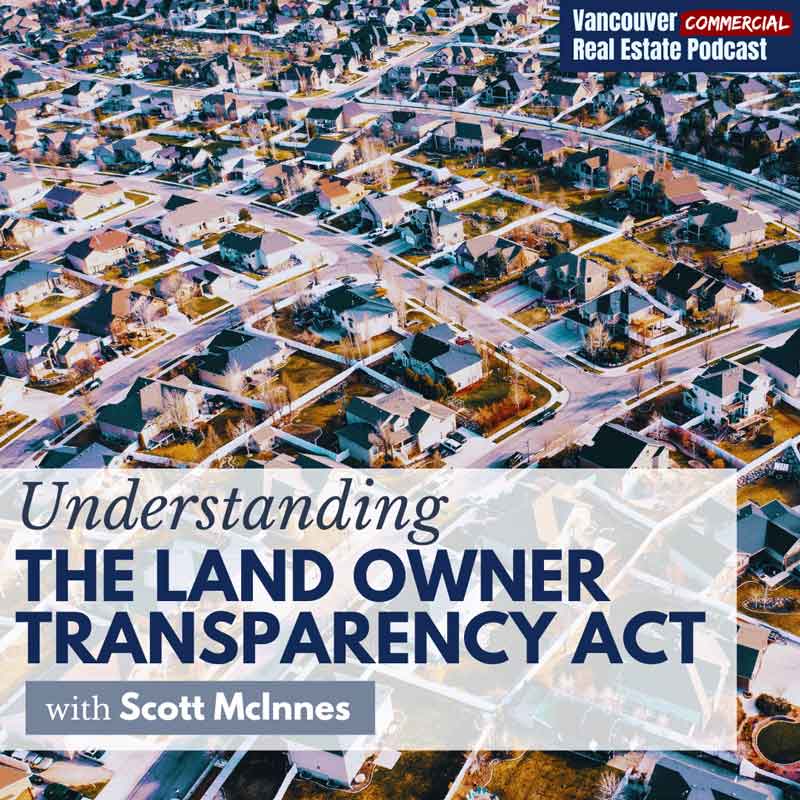
Powered by RedCircle
Do you own land in BC? Are you required to file under the Land Owner Transparency Act by November 30th?
Commercial real estate legal expert Scott McInnes of Redpoint Law is in the studio this week with Cory and Melisa to discuss this all-important deadline for BC landowners. Scott is here to unpack what exactly the Land Owner Transparency Act is, if it applies to your property, and more importantly, if you are required to file by November 30th, 2022.
If you are like most landowners in BC and have no idea about this requirement for most commercial properties in BC, you will want to make sure you listen to this episode.
Who is Scott McInnes?
I’m a partner at Redpoint Law; we just passed our first year in operation. We do a lot of real estate and business law. It’s been a great first year!
What is the Land Owner Transparency Act (LOTA)? What is required of commercial land owners?
The Land Owner Transparency Act (LOTA) actually goes back 6-7 years ago when reports of money laundering came out around land deals in BC. $6 billion was being laundered through real estate. So the LOTA is the last step of BC clamping down on money laundering and asking who is really buying land.
The first step was the Property Transfer Tax Form in 2018 where each property transfer needed to identify the parties and corporations involved in the deal. They then brought in the Transparency Register to identify people holding shares in a company in 2020. Lastly, the Land Owner Transparency Act was brought forward in December 2021.
The Land Owner Transparency Act says that every purchase needs to have a Transparency Declaration for reporting bodies. If you’re a corporation, you’re usually considered a reporting body.
Any land acquired after Dec 1, 2021 would already have a Transparency Declaration included. So the new filing deadline of Nov 30, 2022 is only for acquisitions that took place before Dec 1, 2021. But that’s still a lot of landowners, so we’re going to see a lot of filing happening in the next month.
Who needs to file? Reporting bodies such as BC corporations or someone who is holding property in trust, whether that’s a person or a company.
How do landowners know if they need to file a Transparency Declaration?
The only way to file the Transparency Declaration for the LOTA is through a notary or lawyer. Some clients are frustrated by this but it is a requirement and needs to get filed through the Land Title Office. You cannot create and file this on your own.
The Land Owner Transparency Act doesn’t just apply to commercial real estate – it applies to residential real estate too. The important factor is whether you’re a reporting body. If you’re a corporation or person/company who holds property in a trust, this act applies to you.
Generally speaking, if the real owner matches the name on title, there’s no reason to file.
What is the purpose of the Transparency Declaration with the Land Owner Transparency Act?
As mentioned, this started as a response to money laundering. The intent behind the Land Owner Transparency Act is to see who the real owner of a property is.
I also believe this is the first step in making the transfer of a beneficial ownership property taxable. For example, if a landowner holds shares in a trust, rather than selling the title, they can sell the trust. So no title changes hands but there’s a new owner. In that situation, the BC government misses out on all of that property transfer tax. But with this registry, the government would have all of the tools to make these types of sales taxable.
A lot of information is being provided to address the concern of money laundering. My question is how all of the agencies involved will use these tools and share the information.
Is anything similar to this act happening at the federal level?
I don’t envision any other systems going into place at the federal level because property is regulated at the provincial level. Other provinces are coming out with their own version of the LOTA though. I also know the Transparency Registry can be accessed by a number of federal agencies, such as the CRA, Border Services, the RCMP, etc.
If you have a federal company, there’s a similar process to the BC Transparency Registry that needs to be completed. There are some steep penalties if this registry is misleading or if you don’t provide the necessary information.
What kind of information has to be disclosed by reporting bodies on a Transparency Declaration?
Reporting bodies have to file and identify all interest holders of the reporting body on their Transparency Declaration. An interest holder would be anyone who owns 10% or more of the voting shares or total shares of the company. There are also some grouping rules.
It’s a complex file; there’s quite a bit of legwork behind it. If family trusts have voting shares, it gets even more complicated. Many people are frustrated that they have to pay for the filing but the offences for filing incorrectly for corporations are fees of up to $50,000 or up to 15% of the assessed value. So it’s important to get it right.
How do you know if the Land Owner Transparency Act applies to you?
I’m fairly sure that all corporations who own land will get a letter from the government in the mail letting them know they need to file if they are a reporting body.
At Red Point Law, we sent out letters to a bunch of our clients reminding them of the filing deadline. Many accountants are also sending out reminder letters. But there hasn’t been a big press release or news coverage on this, despite the deadline being less than a month away (Nov 30, 2022).
What advice do you have for someone who isn’t sure if they need to file a Transparency Declaration?
Contact a lawyer or notary right away. Many people have a lawyer or notary maintain their company books, so reach out to them as they will have the information needed for filing. Definitely get in touch with someone because you can’t file this yourself and the penalties for not filing are immense.
Find out more: redpointlaw.ca
For all the curious minds interested in commercial real estate investing, grab a coffee and pull up a chair because we have exclusive stories and tips from commercial real estate brokers, investors, developers, economists, urban planners, and everyone in-between. From the successes and failures to the motivations and lessons learned, the Vancouver Commercial Real Estate Podcast is your insight into commercial real estate in Vancouver, Victoria, Kelowna, and beyond.
What's the best real estate market to invest in? What are the commercial real estate asset classes and property types? Hosted by Cory Wright, founder of William Wright Commercial, and co-hosts Adam and Matt Scalena of the Vancouver Real Estate Podcast, our podcast opens the door to real estate investing for everyone from beginner investors to experienced real estate professionals. New episodes are released every Tuesday. Follow the Vancouver Commercial Real Estate Podcast on Apple Podcasts, Spotify, Google Podcasts, or your favourite streaming platforms.

This communication is not intended to cause or induce breach of an existing agency agreement. E&OE: All information contained herein is from sources deemed reliable, and have no reason to doubt its accuracy; however, no guarantee or responsibility is assumed thereof, and it shall not form any part of future contracts. Properties are submitted subject to errors and omissions and all information should be carefully verified. All measurements quoted herein are approximate.
ⓒ William Wright Commercial Real Estate Services 2024
Proudly designed by Burst Creative